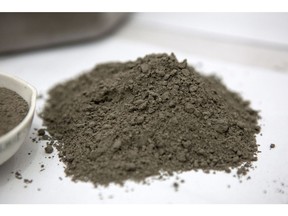Sublime Systems says it has come up with a new two-step process, but more research is needed.

Article content
(Bloomberg) — Boston-based startup Sublime Systems has raised $40 million to develop a breakthrough technology to produce low-carbon cement.
Advertisement 2
Article content
The cement industry contributes as much as 8% to global emissions of planet-warming carbon dioxide. Meeting global climate goals under the Paris Agreement would require reducing that to zero within decades.
Article content
However, cement has proven to be one of the more difficult sectors to clean up because manufacturing low-carbon cement using the existing processes is much more expensive than producing the conventional equivalent.
The other major difficulty is that cement’s emissions aren’t just about the fossil-fuels burned in the production process. Most cement today is made by throwing limestone and sand in a coal-fired kiln, which produces planet-warming gases. Even if the coal is replaced by a clean-energy source, limestone’s chemistry means that some carbon dioxide will still be released.
Advertisement 3
Article content
The solution that has gained most traction among large cement companies seeking to reduce emissions is to build carbon-capture units, which trap carbon dioxide released from their plants before it enters the atmosphere. However, the process is energy intensive and can more than double the cost of the end product.
Sublime says it has come up with a process that cuts both energy use and carbon emissions. The breakthrough was made in the laboratory of serial-entrepreneur Yet-Ming Chiang, who is also a professor at the Massachusetts Institute of Technology. The latest round of investment came from Lowercarbon Capital, along with previous investors Energy Impact Partners and MIT’s The Engine. Sublime also signed on Siam Cement Group, a southeast Asian company, as a strategic investor.
Advertisement 4
Article content
Sublime’s solution involves splitting the cement-making process into two steps. The first step is to make calcium—the key element in limestone—in a form that’s ready to chemically react with silicon—the key element in sand. Sublime reduces energy use and carbon emissions in this step by avoiding limestone and using electricity, rather than coal-fired heat.
The second step, which Sublime is yet to master, involves processing the silicon into a reactive form. Silicon in sand is highly stable, so making it reactive is not easy, but Chiang says there’s some early research showing it can be done. For its first batch of cement, Sublime is using reactive silicon available in nature. Chiang won’t confirm what exactly the startup is using, but examples include calcined clays, coal ash, steel slag, and minerals like olivine.
Advertisement 5
Article content
Sublime cement will then be sold as a mixture of the reactive calcium and reactive silicon. When you add water and gravel, the chemical reaction begins and the mixture starts to harden into concrete. Leah Ellis, chief executive officer of Sublime, says that the hardened cement meets or exceeds industry-set standards.
“It’s a creative approach,” says Venkat Viswanathan, a materials professor at Carnegie Mellon University, who is behind another cement startup that uses electricity. “It’s not clear how much lower the energy use really is.”
Currently, Sublime has a small facility that makes 100 tons of this low-carbon cement. It will use some of the $40 million raised to scale that to as much as 40,000 tons a year by 2025, depending on its success in creating reactive silicon from nature. In the meantime, Chiang says Sublime is working on scaling the process to make synthetic reactive silicon. There’s a long way to go, with Sublime aiming for a commercial-scale plant by 2028.
“Roman cement is the existence proof,” says Chiang, that Sublime’s technology can work. “You can make very durable, long-lasting hydraulic cement.”
—With assistance from Mark Bergen and Christine Driscoll.
https://financialpost.com/pmn/business-pmn/boston-startup-raises-40-million-to-develop-new-low-carbon-cement-technology”>
#Boston #Startup #Raises #Million #Develop #LowCarbon #Cement #Technology

